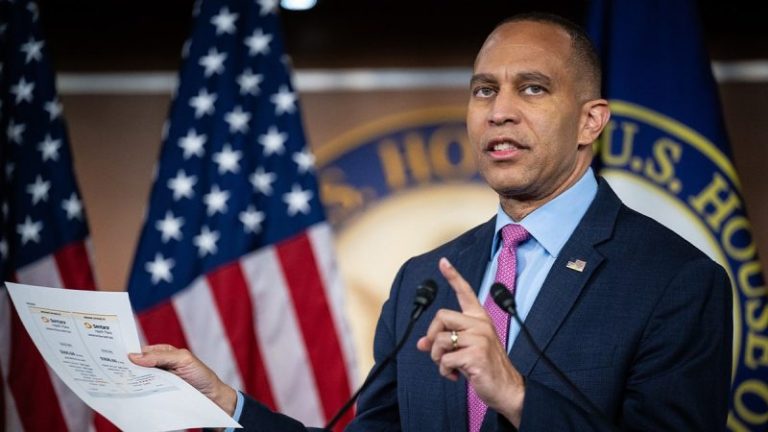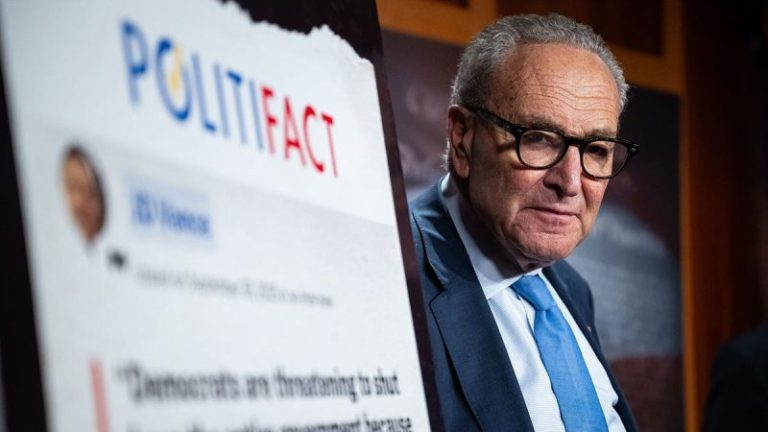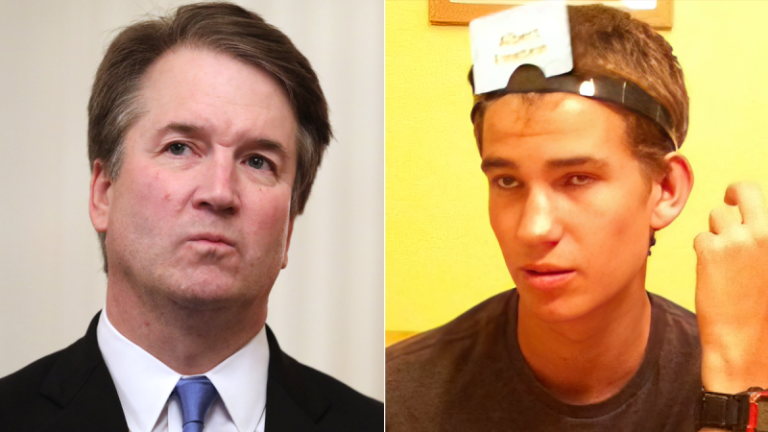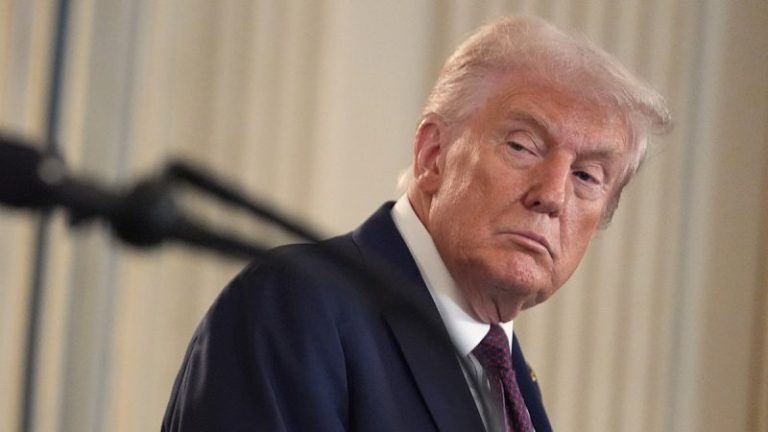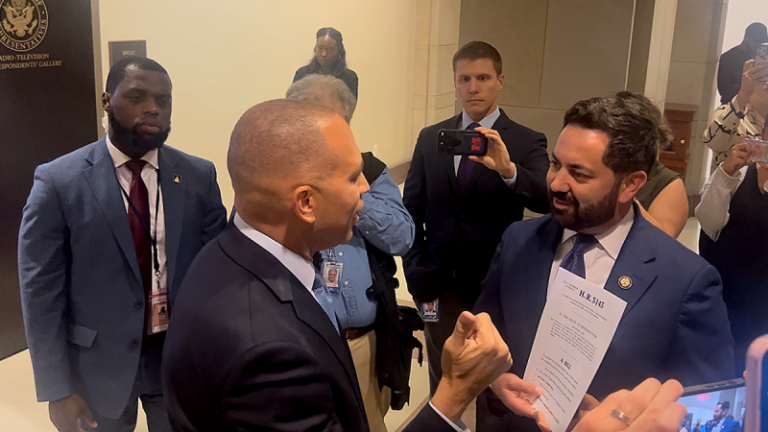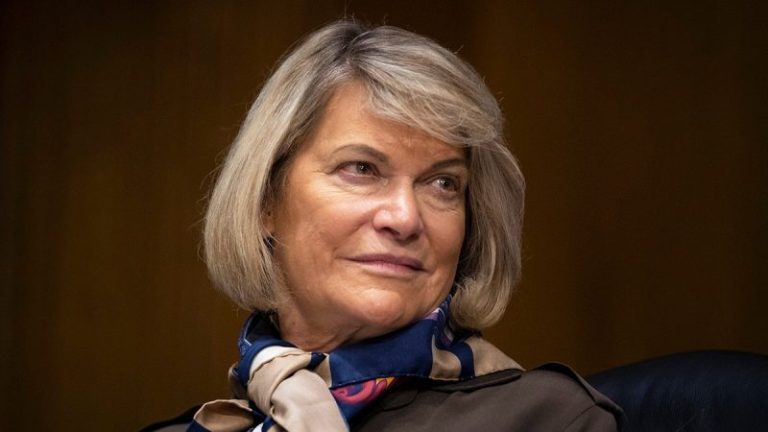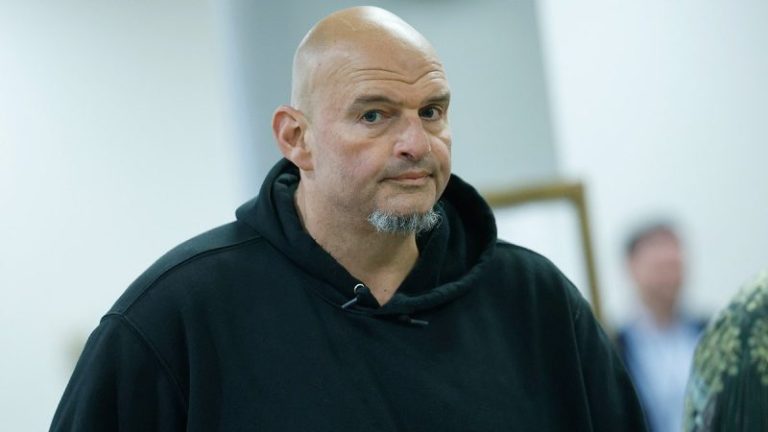Senate Democrats blocked Republicans’ bid to reopen the government for a sixth time on Wednesday as pressure and threats from the White House increased.
It’s been ‘Groundhog Day’ in the Senate for eight days — but unlike the 1993 Bill Murray comedy, there’s been little, if any, forward progress among the cast of senators. Talks are still ongoing, but those have yet to take the leap to full-blown negotiations to end the government shutdown.
The night before the vote Wednesday morning, a bipartisan group of lawmakers met to discuss the shutdown, and a way out, over Thai food in Washington.
Sen. Markwayne Mullin, R-Okla., said the group’s goal was to find a way to reopen the government and keep it open, rather than repeat the same cycle when funding runs out again Nov. 21.
‘We’re not working on a solution to reopen the government. We’re not negotiating. We have a clean CR they’ve got to accept,’ Mullin said. ‘Our whole goal is, how do we avoid, if we do reopen it, how do we avoid shutdown.’
Congressional Republicans are adamant that the best path forward is to pass their continuing resolution (CR), which would keep the government open until Nov. 21, add millions to bolster member security and include a fix to Washington, D.C.’s budget that was overlooked by the House earlier this year.
Senate Majority Leader John Thune, R-S.D., intends to keep putting the same bill on the floor and hopes that fractures form within the Democratic caucus’ unified front. So far, however, only three Senate Democratic caucus members have split from the larger group: Sens. John Fetterman, D-Pa., Catherine Cortez Masto, D-Nev., and Angus King, I-Maine.
But Democrats, led by Senate Minority Leader Chuck Schumer, D-N.Y., have made the fight to reopen the government about healthcare, specifically through the blunt instrument of expiring tax credits under Obamacare, formally known as the Affordable Care Act (ACA).
‘Nothing’s changed,’ Thune said. ‘We all understand, you know what they want to do, and we’re not averse, as I’ve said repeatedly, to have that conversation. At some point, they have to take ‘yes’ for an answer.’
While the credits don’t expire until the end of the year, Democrats argue that come the start of open enrollment on Nov. 1, Americans who rely on the subsidies will see a sharp increase in their premium costs unless Congress acts.
‘We believe that the pressure that the American people are putting on the Republicans, which are already seeing signs of cracking, are going to get them to come to the table, and we can negotiate a good deal for the American people,’ Schumer said.
But their ask isn’t totally one-dimensional, either. Their counter-proposal to the GOP’s CR laid out in sharper terms that they want a permanent extension to the Obamacare subsidies, to see guardrails put on President Donald Trump’s ability to claw back funding through the rescissions and impoundments process, along with a full repeal of the ‘big, beautiful bill’s’ healthcare title and the return of canceled funding for NPR and PBS.
‘Listen, this is a unique moment, a unique moment where we can demand that we’re only going to vote for a budget that helps our people and stops the lawlessness,’ Sen. Chris Murphy, D-Conn., said. ‘I want the ACA subsidies restored, but I also would be a sucker to vote for a budget that allows Trump to continue to get away with this level of corruption and allows him to just cancel the spending in the bill for states like Connecticut.’
Lingering in the background are the threats from the administration led by Office of Management and Budget (OMB) Director Russ Vought. He has already withheld nearly $30 billion in infrastructure funding for blue cities and states, and through a pair of memos, ordered agency layoffs and suggested furloughed workers may not receive back pay.
The latter move runs counter to a law signed by President Donald Trump guaranteeing back pay for furloughed workers after the 2019 shutdown, the longest in U.S. history.
While firings were thought to be around the corner, Trump appeared to give some breathing room on the issue on Tuesday.
‘I’ll be able to tell you that in four or five days,’ Trump told reporters. ‘If this keeps going on, it’ll be substantial, and a lot of those jobs will never come back, but you’re going to have a lot closer to a balanced budget.’
Still, Senate Democrats remained unfazed by the threats, particularly the latest of workers going without back pay.
‘I’m not sure Trump’s floating it,’ Sen. Tim Kaine, D-Va., said. ‘He’s got underlings who were floating submarining one of Donald Trump’s accomplishments. It was Donald Trump that made that guarantee when he signed the bill in January 2019, and now he’s got functionaries in OMB suggesting they may go back on what he promised. I hope he takes pride in his work.’
This post appeared first on FOX NEWS



